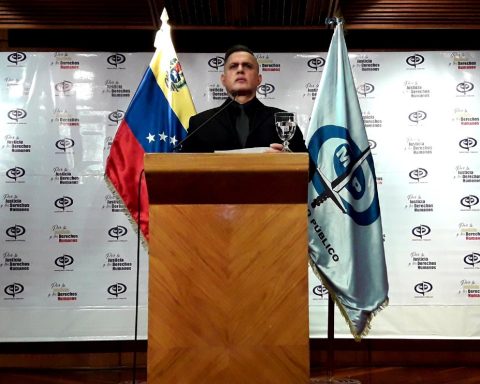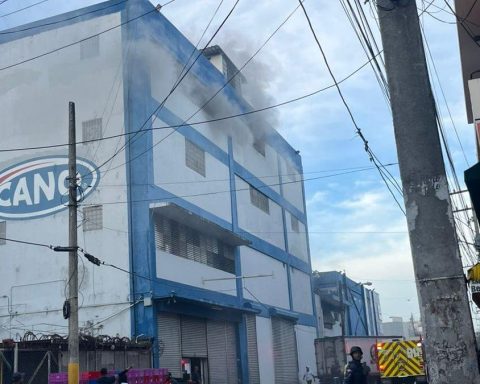There, where the production of energy requires not only the operational experience that YPF has achieved in its 100 years of history, but also the scientific and technological contribution that ensures the sustainable exploitation of unconventional deposits, is where Y-TEC enters the scene, whose President, Roberto Salvarezza, characterized energy as “crucial for the growth” of Argentina and pointed out that in promoting the development of green hydrogen, it is one of the core projects of that company managed by YPF and Conicet within the framework of the energy transition in which the country is embarking.
Salvarezza is in charge of Y-TEC, the company created in 2013, during the presidency of Cristina Fernández de Kirchner, and made up of YPF (51%) and Conicet (41%). From its website, the state company itself is presented as “a bridge between the scientific and productive sectors.”
The former Minister of Science, Technology and Innovation of the Nation -he held that position from the beginning of the presidential administration of Alberto Fernández until September of last year- received Télam at the headquarters of the technology company, built on a 13,000 square meter site located in the Buenos Aires district of Berisso.

“Y-TEC is the interface of two worlds: that of energy production, which is YPF, and that of knowledge, science and technology, which is Conicet. We are committed to the country’s development,” Salvarezza summed up in a report made on the occasion of the first centenary of YPF’s life, whose commemoration tomorrow.
“Y-TEC was created at a very special moment, in 2013, when YPF was recovered. Argentina had the challenge of exploiting unconventional deposits and seeking technological solutions to avoid the decline of conventional resources.“, he indicated. And he pointed out that it was later when “other challenges appeared, such as renewable energies”.
“YPF Luz began to venture into solar and wind power, and demands for energy solutions also appeared, not just for gas and oil, but linked to renewable energies such as lithium, which is beginning to be seen as a strategic energy resource, not pollutant,” he continued.

He maintained that, at present, “in the area of energy, gas and oil are being worked on for YPF, and also for innovative solutions within the framework of renewable energies.”
Salvarezza said that the development of technological activity related to non-conventional resources allowed Argentina “to maintain a level of energy”, because “if it had been for conventional resources, today it would be in a really very difficult situation. complicated”.
He said that “in the case of conventional resources, work is being done on the development of polymers, which are the ones that favor extraction” and said that, meanwhile, Y-TEC is also advancing in the industrialization of lithium, which can be used for development of batteries for mobile devices such as cell phones, tablets and laptops, in addition to the component related to electromobility.

“We are working on the preparation of materials for the batteries. All this is being done at the laboratory level, but also at the pilot plant and pre-industrial plants,” he described and announced that in August “the first equipment for the national battery plant will be received.” lithium”, a joint venture between the University of La Plata and Y-TEC.
Salvarezza stressed that the company is also carrying out “other developments in terms of lithium extraction, because the process is currently very expensive, very slow, and because a lot of water evaporates.”

“You have to evaporate water from the salt flats to concentrate the lithium that is there and, later, there is a whole process to manufacture lithium carbonate. In a pilot plant in Jujuy we are testing electrochemical methods to be able to accelerate these processes and not waste water. We seek a process that allows us to separate all the lithium, separate the salts, but not waste water and achieve methods that are sustainable,” the former minister graphed.

In parallel, he acknowledged that “work is beginning to be done very strongly on the hydrogen issue, which is produced from wind and solar energy.” In this sense, he stated that “Argentina is a natural scenario for this type of energy, since Patagonia is one of the places with the best winds on the planet and the northwest of Argentina has very powerful solar energy.”
“This is one of the most promising alternatives in terms of clean energy. It is obtained through renewable energies such as solar or wind energy. It then becomes an energy vector that can be used for vehicles and industries. It is a fuel that instead of releasing carbon dioxide, which is a pollutant, it generates water,” he added.
“It becomes a very strong energy vector”, he remarked and asserted that “that hydrogen, for example, can replace gas in cars or in a thermal power plant”.

“Green hydrogen has a cost that makes it prohibitive compared to fossil fuels“, said Slavarezza, after which he estimated that he also se should “wait for the most advanced economies, such as Germany or Japan, to advance in their plan to replace gas or fossil fuels”.
“Germany wants to start working with green hydrogen for the iron and steel industries, part of the transport and chemical industry. They want to lower the level of gas, carbon or oil. They are going to use green hydrogen. Japan is less ambitious, it wants to use green hydrogen or blue hydrogen,” he said.
He analyzed that “it is very promising in the future perspective”, and stressed that “these energy transition projects are going to replace fossil fuels with hydrogen”.

On the other hand, Salvarezza said that “Argentina has a lot of gas” and stated that “blue hydrogen is also tempting” because “it is obtained from fossil fuels, but without releasing carbon dioxide into the atmosphere, which is friendlier to the environment as well as being cheaper”.
“Hydrogen is the future. We must prepare ourselves to be able to play that match, have the necessary infrastructure and technology for it,” Salvarezza emphasized.
In this context, he stressed that, for this, Y-TEC set up the H2OAr Consortium made up of some 50 companies from various fields since “today they can use hydrogen as a fuel to move a ship or a locomotive, or to replace the use of gas in a steel furnace or in a thermal power plant”.
“There is a spectrum of very important national and foreign industries that are looking at hydrogen as an immense potential for their future, taking into account that fossil fuels are going to lose their role, their proportion of generating energy in the coming decades,” he described. official.

He highlighted “the Fortescue project, in Río Negro; Enarsa, in Bahía Blanca; and another in Tierra del Fuego with foreign investors”, for which -he evaluated- “there is a lot of interest” in this type of production.
“Part of our job is to see the possibilities of the national industry and technology in developing equipment that we know is going to be used in that game that is going to be played, something that some of these equipment have been made in the country” , said.

In that context, Salvarezza stated that the macrismo “severely punished both YPF and Conicet” by defunding both, while the current government came out to “support national industry, national development and science”.
Lastly, he said that “the 100 years of YPF are a very important celebration for everyone and the 10 years of Y-TEC signify the need that the entire productive world has today to incorporate knowledge in science and technology.”

Salvarezza defended offshore oil exploration in the Argentine Sea
The president of Y-TEC, Roberto Salvarezza, expressed his agreement with offshore oil exploration in the Argentine Sea, assuring that he is “in favor of all technologies, but with environmental care, which is something that has been incorporated into the productive world.
“From Y-TEC we favor everything that is technological development, but taking extreme care of the environment”said the official in an interview with Télam.
He pointed out that “Argentina has a dispute issue in the South Atlantic and in the Argentine Sea, with a power (by Great Britain) that occupies the Falkland Islands, so the fact of being able to explore and know what energy resources count is a matter of sovereignty”.
“Exploration and knowing what we have is important. Today we have data that makes one think that there are very important resources, but we have to confirm it“, continued who knew how to be in charge of the Ministry of Science, Technology and Innovation until September of last year.
The president of Y-TEC considered that “as a scientific community, we are in favor of knowledge and we want to know the resources that Argentina has.” And he added that the fact that a very important well has appeared off the coast of Africa “would seem to support the hypotheses that there are very high resources in the area of the region that is now under study.”
He also argued that “this creates a possibility of having more jobs” and asked to consider that “YPF, our flagship company, owns the resource.”
“They are not multinational companies that come from abroad. YPF has a history of having carried out oil exploitation with all the care and technology. He’s made a lot of progress, so the risks go down,” he continued.
He then expressed that “Argentina has a huge problem of poverty and energy is crucial for growth” and pointed out that “leaving a hydrocarbon reserve at a time when these hydrocarbons still allow us to walk the energy transition would be very unintelligent on our part” .
The official considered thatArgentina has 300,000 square kilometers of seismic; drilled 190 wells in the sea, of which 30 are in operation and supplies 20% of the gas consumed by Argentines“.
“Offshore is not something unknown to Argentina, there is offshore exploitation and there have been no major incidents, nor has the marine fauna been affected in its reproduction or breeding,” he concluded.


















